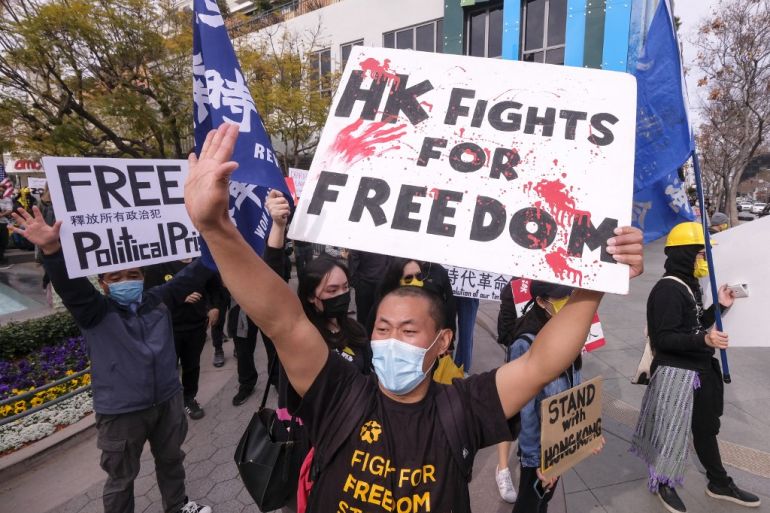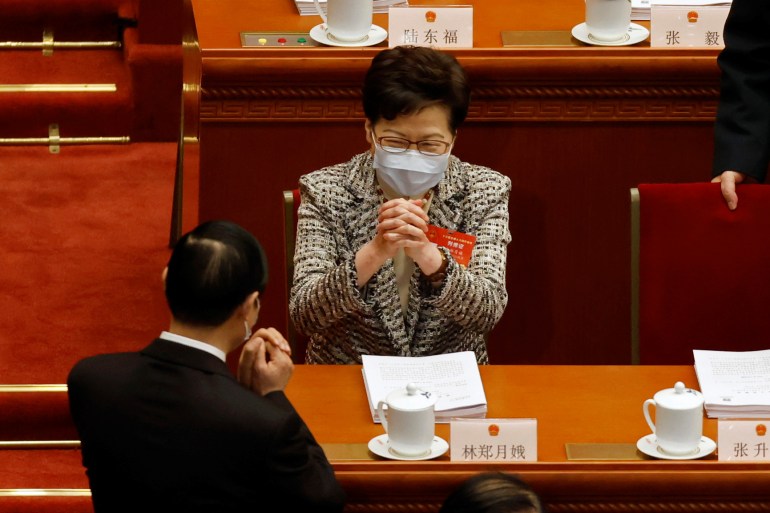US says electoral changes in Hong Kong ‘assault on democracy’
US Secretary of State Antony Blinken says new rules run counter to promises made at the handover in 1997.

US Secretary of State Antony Blinken has condemned China’s approval of sweeping changes to Hong Kong’s electoral system, calling the move an “assault on democracy” and a “direct attack” on the autonomy promised for the territory when it was returned to Chinese sovereignty in 1997.
In a statement on Thursday, just hours after Beijing approved its plan to veto candidates for political office in Hong Kong, Blinken said the measures ran counter to the objective that Hong Kong elections “should progress towards universal suffrage”.
Keep reading
list of 3 itemsUS slams China’s proposed new veto powers on Hong Kong
China approves plan to veto Hong Kong election candidates
The territory’s Basic Law, its mini constitution, includes a promise of eventual universal suffrage.
“These actions deny Hong Kongers a voice in their own governance by limiting political participation, reducing democratic representation and stifling political debate,” Blinken said.
He urged Chinese and Hong Kong authorities to allow the already delayed September Legislative Council elections to proceed and “ensure that all candidates are included in a transparent and credible manner”. There have been reports the elections could be postponed again as Hong Kong considers the changes in the vetting process of candidates.
Blinken did not say if Washington was considering additional steps in response to the measures. Hong Kong leader Carrie Lam and other officials are already subject to sanctions following the crackdown on pro-democracy protesters in 2019.
Beijing has said the changes in Hong Kong are necessary to ensure only “patriotic” officials run the city’s government.
At last year’s National People’s Congress, the rubber-stamp parliament passed the national security law, which was imposed on June 30.
Dozens of opposition politicians, activists and community leaders critical of the Chinese-backed Hong Kong government have since been detained and charged under the new law, in a move critics say is designed to instil fear among the city’s residents and silence dissent.
Broken promises
On Friday, Hong Kong and Macau Affairs Office Deputy Director Zhang Xiaoming said that the electoral changes were meant to guard against a “power grab” in the territory.
He also said that it is aimed to remove “those against China and those attempting to destabilise Hong Kong”. Before the changes, 50 percent of seats in the legislature were directly elected, with the remainder assigned to industry groups, while the chief executive – with candidates vetted first by Beijing – was chosen by a committee.
The current Chief Executive Carrie Lam who took office in 2017 said she was “delighted” with the changes.
Beijing has dismissed criticisms from Western governments as “interference” in its domestic affairs.
Blinken said that ignores China’s agreement with the United Kingdom to uphold the city’s “autonomy and enumerated rights and freedoms” until at least 2047.
He urged Hong Kong authorities to release and drop charges against all individuals charged under the national security law.

“The United States stands united with our allies and partners in speaking out for the rights and freedoms of people in Hong Kong,” Blinken said.
British Foreign Secretary Dominic Raab said the new measures were “contrary to the promises” that China made to the UK.
“This can only further undermine confidence and trust in China living up to its international responsibilities and legal obligations as a leading member of the international community,” Raab said in a statement.
Meanwhile, the European Union has warned that it could take “additional steps” in response to the electoral changes.
HKMAO deputy director Zhang Xiaoming said HK’s electoral reform is a question of guarding against “power grab”, subversion and infiltration, instead of democratic progress, and there’s no room for concession. pic.twitter.com/ynCceOAgAA
— Alvin Lum (@alvinllum) March 12, 2021
In a statement on behalf of the 27-nation bloc, EU Foreign Affairs chief Josep Borrell said the decision “will have a significant impact on democratic accountability and political pluralism in Hong Kong”.
“The European Union regrets that the fundamental freedoms, democratic principles and the political pluralism that are central to Hong Kong’s identity and prosperity are under increasing pressure by the authorities.”
There have been discussions among EU foreign ministers about the possibility of broader sanctions if the situation in Hong Kong worsens.
Separately, the EU announced on Thursday sanctions on Chinese officials in connection to the reported rights abuses against Uighurs in Xinjiang.